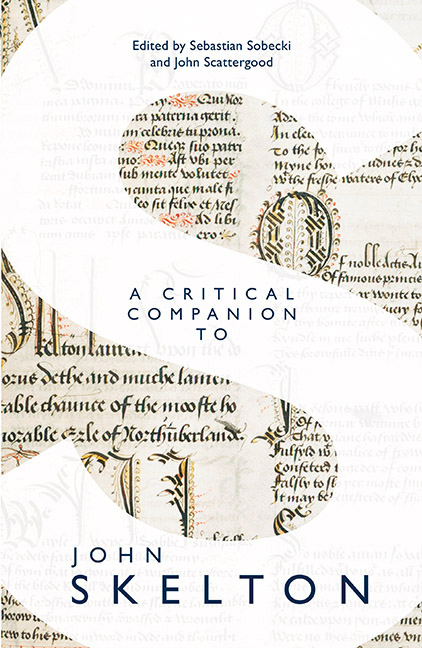Book contents
- Frontmatter
- Dedication
- Contents
- Acknowledgements
- Contributors
- Abbreviations
- Conventions
- Introduction
- 1 John Skelton (?1460–1529): A Life in Writing
- 2 Religion
- 3 Law and Politics
- 4 Classical Literature
- 5 Humanism
- 6 Satires and Invectives
- 7 Lyrics and Short Poems
- 8 Skelton's Voice and Performance
- 9 Literary Tradition
- 10 Skelton and the English Language
- 11 Skelton's English Works in Manuscripts and Print
- 12 Skelton's English Canon
- 13 Reception and Afterlife
- A Skelton Bibliography
- Index of Manuscripts
- Index of Printers and Stationers
- General Index
3 - Law and Politics
Published online by Cambridge University Press: 24 July 2019
- Frontmatter
- Dedication
- Contents
- Acknowledgements
- Contributors
- Abbreviations
- Conventions
- Introduction
- 1 John Skelton (?1460–1529): A Life in Writing
- 2 Religion
- 3 Law and Politics
- 4 Classical Literature
- 5 Humanism
- 6 Satires and Invectives
- 7 Lyrics and Short Poems
- 8 Skelton's Voice and Performance
- 9 Literary Tradition
- 10 Skelton and the English Language
- 11 Skelton's English Works in Manuscripts and Print
- 12 Skelton's English Canon
- 13 Reception and Afterlife
- A Skelton Bibliography
- Index of Manuscripts
- Index of Printers and Stationers
- General Index
Summary
It would appear that little can be gained by parsing Skelton's writings for traces of the law. Among the works securely attributed to him there is no discourse on legal thought or treatise on jurisprudence. Yet the law is never truly absent from Skelton's writings. Legal references appear in a number of his works, including Magnyfycence, A Replycacion Agaynst Certayne Yong Scolers Abjured of Late, and the three Wolsey satires. The religious bile of the Replycacion and its investments in the persecution of heterodox beliefs has been treated by Vincent Gillespie (1997), and Bradin Cormack has expounded the substantial implications of Skelton's ideas in Magnyfycence about the juridical role of the Household (Cormack 2007: 47–84). Cormack's argument that Skelton's views echo the thought of the fifteenth-century jurist John Fortescue is significant, and, I argue, also holds true for other areas of the poet's oeuvre. As for politics, Skelton's three scathing Wolsey satires – Speke Parott, Collyn Clout and Why Come Ye Nat to Courte? – reveal the poet's intimate familiarity with the workings of the Chancery and the policies of its controversial incumbent, Thomas Wolsey, while the topical poems Howe the Douty Duke of Albany and A Ballade of the Scottysshe Kynge (as well as its revision, Agaynst the Scottes) rely on the audience's ability to pinpoint and contextualise the circumstances surrounding specific political events. Whether in or out of royal grace, Skelton has been thoroughly studied as a politically situated figure (Walker 1988; Scattergood 2014; Hadfield 2009), but no one has yet attempted to distil Skelton's idea of politics from his works and to scrutinise (in senses 2 and 4 of the OED's definition) his ‘theory or practice of government or administration’, his ‘political ideas’ and ‘beliefs’, and ‘the assumptions or principles relating to or underlying any activity … when concerned with questions of power and status in a society’.
This chapter examines Skelton's grasp of legal practice and of the law as a public institution, while teasing out his underlying political ideas and principles.
- Type
- Chapter
- Information
- A Critical Companion to John Skelton , pp. 37 - 51Publisher: Boydell & BrewerPrint publication year: 2018



